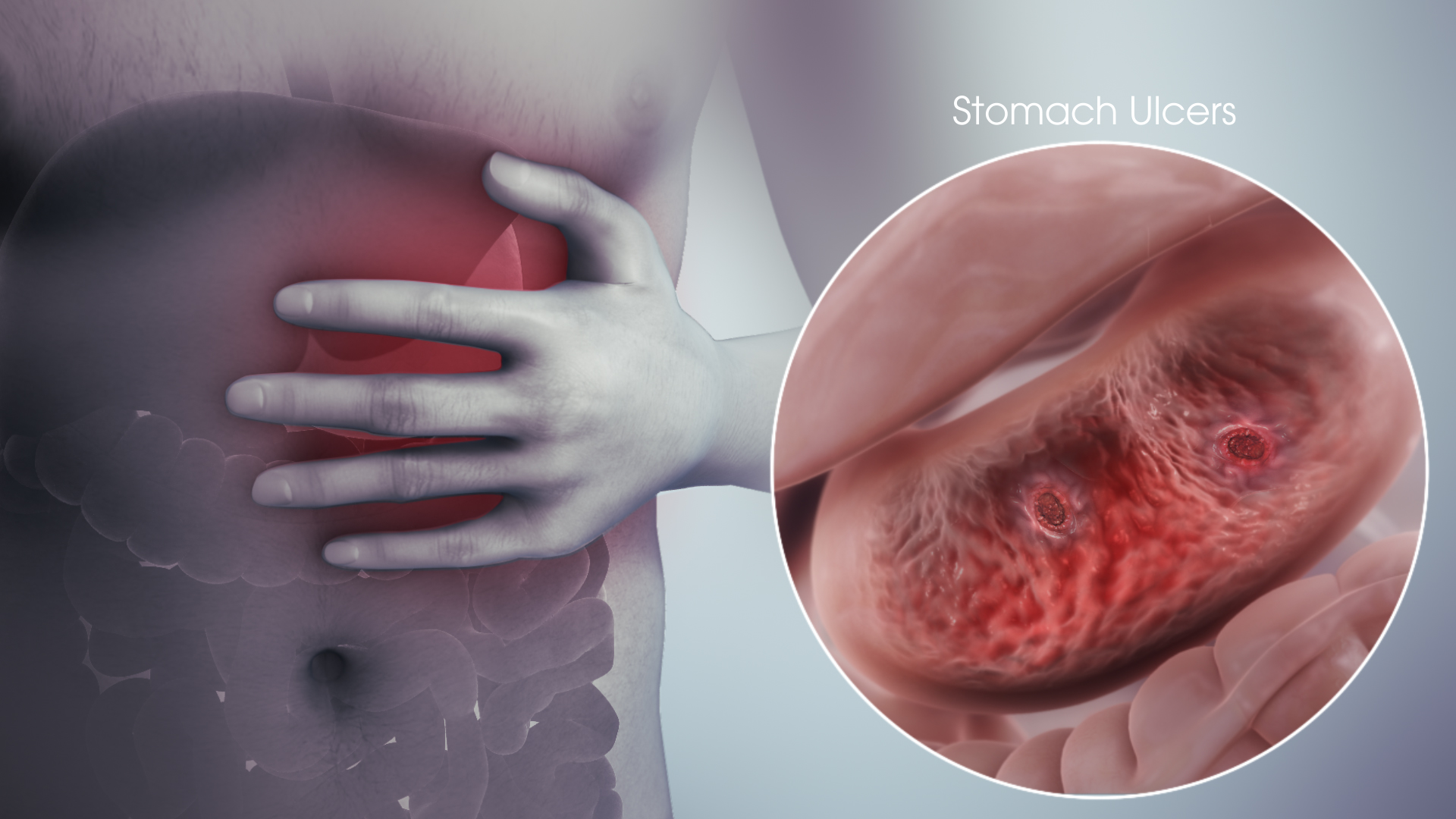An ulcer is a break in the internal mucosal lining of an organ. An ulcer in the stomach is known as a gastric ulcer. It often causes a painful, burning sensation that may worsen with eating. In worse cases, there may be vomiting of blood due to bleeding directly from a gastric ulcer, or from damage to the esophagus from continuous vomiting. Rarely, an ulcer can lead to a gastric perforation developing into acute, extremely painful peritonitis that requires immediate surgery.

3D Medical Animation still showing Stomach Ulcer
Causes:
1. H. pylori
Helicobacter pylori flourishes in an alkaline environment. Hence, it secretes urease enzyme to create suitable conditions for itself. Adhesin protein expressed by the bacterium enables it to attach to the gastric epithelium. Besides, H. pylori also expresses virulence factors such as CagA and PicB which cause inflammation in the mucosal lining of the stomach. Inflammatory cytokines inhibit the acid secretion by parietal cells, as well as gastrin secretion. This reduced acidity leads to gastric ulcers.
Our body’s immune response towards the bacteria makes it release tumour necrosis factor (TNF) and Lymphotoxin alpha, which also play a role in gastric inflammation.
2. NSAIDs
Consumption of nonsteroidal anti-inflammatory drugs (NSAID) and aspirin almost quadruples the chances of developing peptic ulcer disease. Combining NSAIDs with corticosteroids, or anticoagulants, increases the risk of bleeding. The gastric mucosa protects itself from gastric acid with a layer of mucus, the secretion of which is stimulated by certain prostaglandins. NSAIDs block the enzyme crucial for prostaglandins’ production. Besides, NSAIDs also inhibit stomach mucosa cells proliferation and mucosal blood flow, reducing bicarbonate and mucus secretion, which reduces the integrity of the mucosa.
Besides there are certain minor causes that, when coupled with the above primary causes, can cause ulcers:
Serious health problems requiring intensive care can cause stress that may lead to development of peptic ulcers.
Over intake of spicy food, caffeine, alcohol, are some factors hypothesized to cause ulcers.
Other causes of peptic ulcer disease includes: gastric ischaemia, drugs, metabolic disturbances, cytomegalovirus (CMV), upper abdominal radiotherapy, Crohn's disease, and vasculitis. Gastrinomas (Zollinger–Ellison syndrome), rare gastrin-secreting tumors, also cause multiple and difficult-to-heal ulcers.
Conclusion
Stomach ulcers get worse if not treated. The biggest concern is the relationship between H pylori and gastric cancer. The International Agency for Research on Cancer and the World Health Organization have classified H pylori as a definite carcinogen. Therefore, treatment and eradication of H pylori should be considered in infected persons.
Disclaimer: The information in no way constitutes, or should be construed as medical advice. Nor is the above article an endorsement of any research findings discussed in the article an endorsement for any of the source publications.

Squeezing Stomachs To Get Rid Of Obesity: An Account On Gastric Restriction
… because an estimated 40% of the US population is fast treading the path towards being “morbidly obese.” Read More..

Digestive System: Role of Stomach and Small Intestine
Let’s see what happens to the food as it moves through various organs of the digestive system... Read More..








